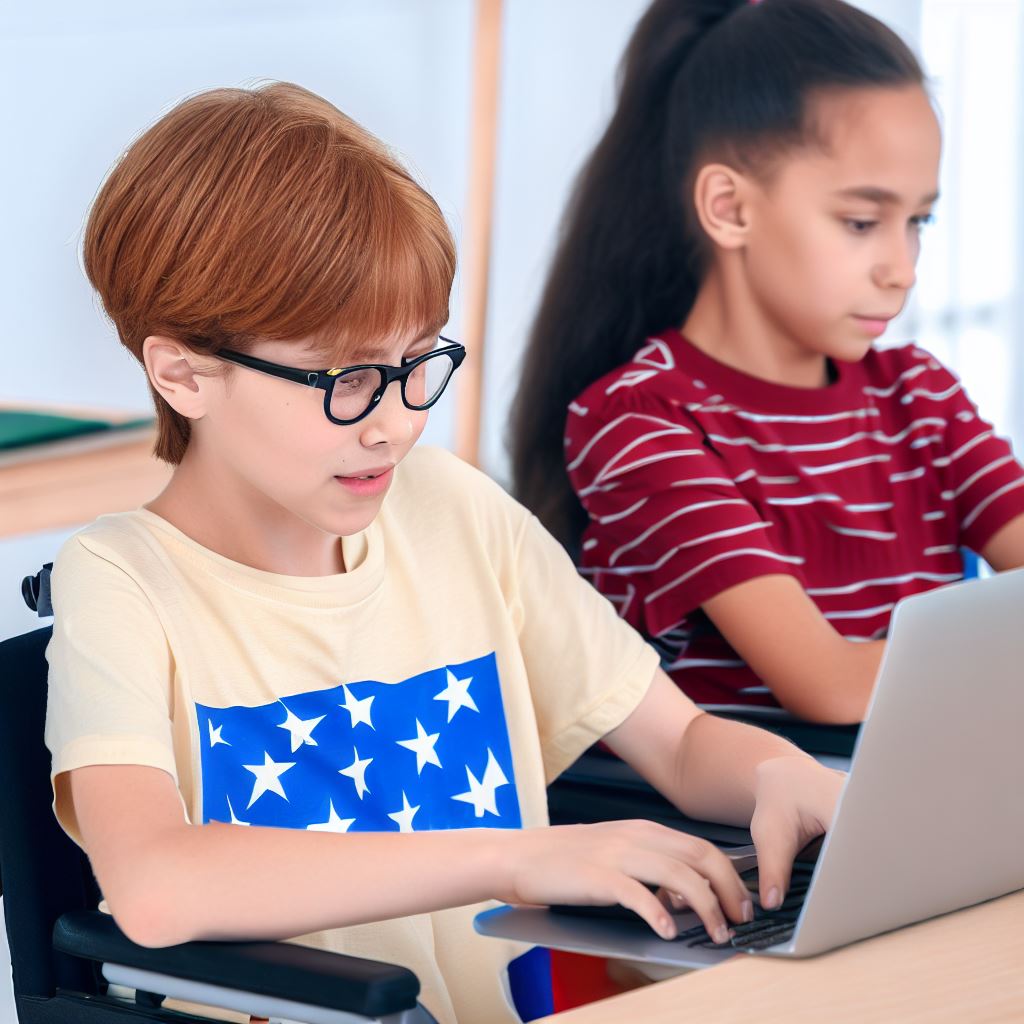Introduction
Accessible Coding Classes for Kids with Special Needs
In today’s digital age, coding is becoming an increasingly valuable skill.
It’s a language that empowers individuals to create, innovate, and solve problems.
However, this opportunity must extend to all children, including those with special needs.
The Importance of Inclusive Coding Education
1. Empowering Every Child
Coding isn’t just about creating software or apps; it’s about nurturing creativity and critical thinking.
Inclusive coding education ensures that every child, regardless of their abilities, can unlock their potential.
2. Building a Diverse Future
The technology industry plays a significant role in shaping our world, yet it often lacks diversity.
Inclusive coding classes help bridge this gap by welcoming children with special needs into the tech community.
This diversity of thought can lead to innovative solutions that benefit everyone.
Fostering Empathy and Understanding
Inclusive coding education isn’t just for children with special needs; it’s an opportunity for all children to learn about diversity and inclusivity.
These valuable life lessons can promote empathy and understanding from a young age.
Purpose of the Blog Post
This blog post aims to explore the significance of accessible coding classes for kids with special needs.
We will delve into the benefits of inclusive coding education and provide insights into how parents, educators, and policymakers can work together to make coding accessible to all children.
Understanding the Needs of Kids with Special Needs
Common types of special needs in children
- Autism Spectrum Disorder (ASD): Children with ASD often have challenges with social interaction and communication.
- Attention Deficit Hyperactivity Disorder (ADHD): Kids with ADHD struggle with impulsivity, hyperactivity, and focus.
- Intellectual Disabilities: Children with intellectual disabilities have limitations in cognitive functioning and adaptive behavior.
- Physical Disabilities: These include conditions that affect mobility, such as cerebral palsy or muscular dystrophy.
- Sensory Processing Disorders: Kids with sensory issues may struggle with processing information received through their senses.
Challenges faced by kids with special needs in traditional coding classes
Traditional coding classes may not cater to the specific needs of children with special needs, leading to:
- Lack of individualized attention and support
- Difficulty with auditory instructions or verbal communication
- Inability to keep up with the pace of the class
- Sensory overload due to bright lights, loud noises, or uncomfortable seating
- Frustration due to the need for repetitive explanations or personalized learning methods
The importance of adapting coding classes to meet their specific needs
Adapting coding classes to meet the specific needs of kids with special needs is crucial because:
- It provides equal opportunities for learning and personal growth
- It promotes inclusivity and a sense of belonging among all students
- It fosters the development of cognitive, problem-solving, and analytical skills
- It enhances communication and social interaction abilities
- It builds self-confidence and self-esteem by showcasing their abilities and talents
By understanding the needs of kids with special needs and adapting coding classes accordingly, we can create an accessible and supportive environment that empowers these children to thrive.
Tech Consulting Tailored to Your Coding Journey
Get expert guidance in coding with a personalized consultation. Receive unique, actionable insights delivered in 1-3 business days.
Get StartedRead: How Coding Skills Can Help Kids in School and Life
Benefits of Accessible Coding Classes
Advantages of providing coding opportunities for kids with special needs
- Enhances problem-solving skills: Coding classes help children with special needs develop critical thinking and analytical abilities.
- Promotes creativity: Coding allows kids to express their ideas and develop innovative solutions.
- Builds confidence: Kids learn to tackle challenges, boosting their self-esteem and belief in their abilities.
- Fosters independence: Coding empowers children with special needs to work on projects independently, promoting self-reliance.
- Encourages perseverance: The iterative nature of coding teaches kids to persevere and learn from mistakes.
Positive effects on cognitive and social development
- Cognitive development: Coding classes improve cognitive skills, including attention, memory, and sequencing abilities.
- Logical reasoning: Kids with special needs develop logical thinking and problem-solving strategies through coding.
- Attention to detail: Coding requires kids to pay attention to details, enhancing their focus and concentration.
- Collaboration and teamwork: Group coding activities promote social interactions and collaboration among peers.
- Communication skills: Kids learn to express their thoughts and ideas, improving their verbal and written communication.
Exemplifying the benefits through success stories and case studies
- Sarah’s transformation: Sarah, a child with autism, started coding classes and showed remarkable improvement in her communication and social skills.
- Alex’s problem-solving prowess: Despite his learning disability, Alex became a coding whiz, showcasing his exceptional problem-solving abilities.
- Lucas’s self-confidence boost: Lucas, who has Down syndrome, gained confidence and independence by creating his own coding projects.
- Mia’s creativity unleashed: Mia, a child with ADHD, discovered her creative potential through coding and developed innovative applications.
- Ethan’s teamwork and collaboration: Ethan, a child with cerebral palsy, thrived in group coding activities, building strong teamwork and collaboration skills.
These success stories and case studies highlight the immense benefits accessible coding classes bring to kids with special needs.
By providing coding opportunities, we empower children to be confident, independent thinkers with improved cognitive and social skills.
The positive impact on their lives is undeniable.
Foster creativity and self-expression
Not only do accessible coding classes enhance problem-solving and critical thinking skills, but they also foster creativity and self-expression.
Kids learn to overcome challenges, promoting resilience and determination.
Through coding, children with special needs develop cognitive abilities, such as attention, memory, and logical reasoning.
Collaborate with their peers
Moreover, coding classes provide a platform for kids to collaborate with their peers, improving their social skills and encouraging teamwork.
Communication skills are also honed as kids express their ideas and share their coding projects with others.
The success stories of Sarah, Alex, Lucas, Mia, and Ethan further exemplify the transformative power of accessible coding classes.
Sarah’s improved communication and social skills demonstrate the incredible impact coding had on her development.
Alex’s exceptional problem-solving abilities, despite his learning disability, showcase the cognitive benefits of coding.
Lucas’s newfound confidence and independence speak to the empowering nature of coding.
Mia’s creative potential was unleashed through coding, while Ethan’s teamwork and collaboration skills flourished.
Build Your Vision, Perfectly Tailored
Get a custom-built website or application that matches your vision and needs. Stand out from the crowd with a solution designed just for you—professional, scalable, and seamless.
Get StartedGenerally, accessible coding classes provide numerous advantages for kids with special needs.
From cognitive and social development to improved confidence and independence, coding has the potential to transform the lives of these children.
The success stories and case studies mentioned reaffirm the extraordinary benefits of coding classes.
By embracing inclusive coding education, we create a more inclusive and equitable society for all.
Read: Is Coding for Kids Just a Trend or a Necessary Skill?

Strategies for Creating Accessible Coding Classes
Accessible coding classes for kids with special needs require thoughtful planning and execution.
These strategies ensure that every child, regardless of their abilities, can engage effectively:
Begin with clear instructions that break down coding tasks into manageable steps.
Visual aids, such as flowcharts and diagrams, help children with diverse learning styles comprehend the material.
Integrate various assistive technologies and tools.
Screen readers aid visually impaired children, adaptive keyboards accommodate physical disabilities, and voice recognition software empowers those with communication challenges.
Establish a supportive learning environment. Instructors should undergo training in special needs education to create an inclusive atmosphere.
Assign mentors for personalized assistance, fostering confidence and growth.
Collaboration is key. Partner with special education experts and consult occupational therapists to tailor the classes to individual needs.
Optimize Your Profile, Get Noticed
Make your resume and LinkedIn stand out to employers with a profile that highlights your technical skills and project experience. Elevate your career with a polished and professional presence.
Get NoticedThis ensures that children receive the best possible support on their coding journey.
Incorporating these strategies transforms coding classes into inclusive spaces where children with special needs can thrive, learn, and express their creativity.
Read: Teaching Kids to Code: Do’s and Don’ts for Parents
Examples of Accessible Coding Programs
Existing organizations or initiatives that specialize in accessible coding classes for kids with special needs.
1. CodeAbility
CodeAbility is an organization that offers coding classes specifically designed for children with special needs.
They focus on creating a supportive and inclusive learning environment where kids can learn programming concepts at their own pace.
Their instructors have expertise in teaching students with diverse learning styles and abilities.
2. Coding for All
Coding for All is an initiative that aims to make coding accessible to all children, including those with special needs.
They provide personalized coding programs tailored to the unique needs and abilities of each child.
Their approach emphasizes hands-on learning and individual support.
3. Access Code
Access Code is a coding program that offers classes for children with special needs.
They focus on using innovative tools and teaching techniques to make coding accessible and engaging.
Their curriculum promotes problem-solving skills, creativity, and collaboration.
Short description of their approaches and methodologies
CodeAbility takes an individualized approach to coding education, providing personalized support and adapting the learning environment to meet the unique needs of each child.
They incorporate multi-sensory teaching techniques and assistive technologies to create an inclusive experience.
Coding for All believes in the power of personalized learning plans.
They develop customized coding programs based on each child’s abilities, learning style, and interests.
Their instructors are trained in special education and use a variety of visual, auditory, and tactile strategies to facilitate learning.
Access Code focuses on creating an engaging and interactive coding experience for children with special needs.
They use hands-on activities, gamification, and accessible coding platforms to make learning fun and empowering.
Their instructors facilitate collaboration and encourage students to explore their creativity.
Read: Coding Games for Kids: Learning Can Be Fun!
Tips for Parents and Educators
Supporting Your Child’s Interest in Coding at Home
- Encourage your child’s curiosity and provide a supportive environment for learning.
- Introduce coding concepts through fun activities and games that your child can engage with.
- Find coding toys or tools specifically designed for children with special needs.
- Collaborate with your child’s teachers and therapists to ensure consistent support and reinforcement.
- Set aside dedicated time for coding activities and make it a regular part of your child’s routine.
- Monitor your child’s progress, celebrate their achievements, and provide constructive feedback.
The Benefits of Incorporating Coding into the School Curriculum
- Promotes problem-solving skills, logical thinking, and critical reasoning abilities.
- Enhances creativity and encourages innovative thinking among students with special needs.
- Develops persistence, patience, and perseverance as coding often requires trial and error.
- Improves communication and collaboration skills through group coding projects.
- Fosters a sense of accomplishment and boosts self-esteem in children with special needs.
- Equips students with valuable technological skills that are increasingly in demand in the job market.
Resources for Finding Accessible Coding Resources or Online Courses
- Research coding platforms or websites that offer accessibility features, such as text-to-speech options.
- Connect with organizations or communities focused on coding education for children with special needs.
- Seek recommendations from educators, special education departments, or support groups.
- Explore online courses specifically tailored for children with special needs.
- Consider utilizing assistive technology tools that can make coding more accessible to your child.
- Stay updated with advancements in assistive technology and coding resources for children with special needs.
By following these tips, parents and educators can ensure that children with special needs have access to coding education that meets their unique requirements and interests.
Remember, coding is for everyone, and with the right support, children with special needs can discover their potential in this exciting field!
Conclusion
Accessible coding classes for kids with special needs play a significant role in their education and development.
By providing these children with opportunities to learn coding in a way that suits their needs, we empower them to build vital skills and enhance their overall learning experience.
These classes not only provide practical programming knowledge but also foster improved problem-solving abilities, critical thinking skills, and creativity.
The potential impact on their personal growth and future career opportunities is immense.
Furthermore, the inclusive nature of these coding classes promotes diversity, acceptance, and empathy among participants.
It enables children with special needs to interact with their peers, fostering an inclusive learning environment that nurtures mutual understanding and appreciation for different abilities.
If you are a parent, educator, or someone interested in supporting children with special needs, we encourage you to explore the available programs that offer accessible coding classes.
Many organizations and online platforms provide tailored curriculum and resources to help these children succeed.
By actively engaging in inclusive learning, we can create a world where every child has an equal opportunity to learn, grow, and thrive.
Let’s work together to break down barriers and create an inclusive society that embraces the unique strengths of every individual.




